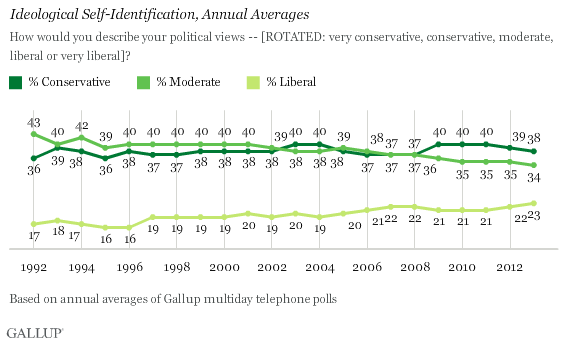Okay I'll wade in and offer the first post in the new Structured Debate zone.
In his column today Jonah Goldberg proposes a thesis that liberalism as it is defined and practiced in modern day America has worn itself out. It's proponents in the media have lost their luster and are no longer able to gain much if any traction in popular appeal. The 2014 election suggested people are looking for something different. President Obama has been able to move his party far to the left, but has been unable to attract recruits to join them.
The article:
Is Liberalism Exhausted RealClearPolitics
Rules for this debate:
:
1. No ad hominem. Address the member's post and make no comment on the character or motive or intent of the member himself or herself.
2. No mention of Republicans or Democrats or any other political party. Keep the focus on liberalism and whether it has or has not run its course in America.
3. Please keep criticism of specific media, political, or other personalities to a minimum.
THE QUESTION TO BE ANSWERED:
Is liberalism exhausted, i.e. has it run its course in America and will fade into the background in coming years?
Classical liberalism is exhausted because the movement has morphed into progressiveness mixed with Statism. Classical liberalism is invested in the inherent rights of people as individuals, the need for government on a limited controlled basis to enhance those rights, and a system of rewards based on merit, with the recipients of those rewards owing service back to those less well off. It had a certain egalitarianism to it.
Liberalism exhausted itself when the proponents stopped using government to free people, and instead started using it to get people to act the way THEY want them to act.
I understand what you are saying. But I gently disagree that classical liberalism morphed into anything. I believe classical liberalism is redefined as the true conservatives or libertarians (little "L") of today. I believe the WORD 'liberal' has been co-opted and redefined in modern day America and bears no resemblance to the liberalism of the late 18th, 19th, and early 20th Centuries.
I believe modern day liberalism in America is a grandchild of a totally different school of thought that produced such disciples as Friedrich Engels and Karl Marx. Certainly all modern day liberals are not Marxists. But they all do seem to embrace the idea that government should be given power to order the sort of society they want to exist and, once that is accomplished, everything will be wonderful. That is why the labels of 'statist' and 'political class' are synonymous with modern day American liberalism.
And if liberalism is exhausted, it would be because people are finally beginning to accept that their own happiness and prosperity has to be their choice and initiative and government cannot do that for them. I hope that is happening.
I also see (small "l") libertarian-ism as the true descendant of classical liberalism. Where I see the connection between classical liberalism and today's version is the type of people drawn to it, and the results they are looking for. Both types want/wanted change, and both have this drive to use government to enact said change. The difference to me is of scope and content. The easiest way to see the actual difference is to reference Animal Farm, where "All animals are equal" morphed into "All animals are equal, but some are more equal than others"
The exhaustion of modern liberalism to me is rooted in the overall reliance of identity politics currently occurring in progressive circles. The "Us" of classical liberalism is being replaced by the "Us vs. Them" of modern liberalism, with multiple "Us'es" fighting each other to see who is the most oppressed, and thus more worthy of being "more equal than others"
Do you really think libertarians want government to effect the change they want? Or do they want government to back off and let the people effect the change? I don't really want to debate that in this thread because it is somewhat off topic, but somebody might want to start a separate thread to discuss that. Or I might if nobody else does.
But it is the overwhelming weight of a bloated, seemingly out-of-control government that is the fruit of liberalism, not libertarianism, that may be alarming people the most. Within liberalism I see its advocates turning a blind eye to a national debt rapidly headed to $18 trillion and beyond, a down graded credit rating for the USA, more and more good American jobs fleeing to more business friendly realms, and the increasing pressure to conform all thought to the liberal point of view and suppress any dissent.
And maybe it is this sort of thing that has become so obvious that more people no longer can ignore it. and they really are becoming weary of it?
